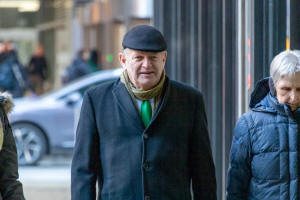Prosecutor calls Madigan, McClain ‘grand masters of corruption’ as case
goes to jury
 Send a link to a friend
Send a link to a friend
 [January 31, 2025]
By Hannah Meisel [January 31, 2025]
By Hannah Meisel
CHICAGO – It was a well-known aphorism during former Illinois House
Speaker Michael Madigan’s record 36 years in power that while others in
the state’s political realm were merely playing checkers, the longtime
Democratic powerbroker was playing chess.
And on Wednesday, after three months of listening to testimony followed
by a marathon week of closing arguments, the lead prosecutor in
Madigan’s corruption trial presented that idiom to jurors before they
were finally released to deliberate.
In a final attempt to weaken defense attorneys’ arguments over the
racketeering, bribery and other corruption allegations against Madigan
and his co-defendant, longtime Springfield lobbyist Mike McClain,
Assistant U.S. Attorney Amarjeet Bhachu told jurors that Madigan and
McClain were neither “stupid” nor “beginners.”
“Mr. Madigan and McClain are adept at making sure Mr. Madigan’s
fingerprints are not left at the scene,” Bhachu said of an episode
involving a proposed land deal that forms the basis of five charges
against the defendants. “They’re not playing checkers. They’re playing
chess. And the two of them are grand masters of corruption.”
It was a line Bhachu used nearly two years ago in closing arguments in a
related trial in which McClain and three other former executives and
lobbyists for electric utility Commonwealth Edison were charged with
bribing Madigan.
The jury in the current trial has not been told that McClain and his
ex-colleagues were convicted in 2023’s “ComEd Four” trial for giving
jobs and contracts for the speaker’s allies in order to grease the
wheels for legislation the utility wanted to see passed in Springfield.
But since October, jurors have learned the ins and outs of ComEd’s last
few decades in business and the major legislative wins it scored that
turned the tide for the once-struggling utility.

They’ve also heard about a similar albeit smaller alleged scheme
involving telecom giant AT&T Illinois. And they’ve heard the several
secretly recorded calls and meetings concerning Madigan’s law firm
recited or picked apart at least a dozen times.
Those wiretapped calls and videotaped meetings were combined with
hundreds of documents like emails, letters, reports and internal records
from dozens of people involved in the alleged episodes that make up the
charges.
The jury heard from 64 witnesses, including star government witnesses
with plea deals and Madigan himself, who took the stand in his own
defense earlier this month in a surprising turn of events.
Attorneys on both sides spent the last week of closing arguments trying
to spin key pieces of evidence in their favor, culminating in
prosecutors’ rebuttal arguments Wednesday.
While Bhachu spent time trying to rehabilitate the trustworthiness of
key FBI cooperating witnesses after defense attorneys ripped them to
shreds this week, he also devoted significant time to Madigan’s own
testimony. In a handful of side-by-side comparisons with moments from
secret recordings and testimony from others called during trial, Bhachu
told jurors the only explanation for the discrepancies was that that
Madigan had lied.
“To believe Mike Madigan’s testimony, you’d have to believe all these
folks were lying either in testimony or on tapes,” Bhachu said, naming
nine people either called as witnesses or heard in the recordings.
‘Usual course of business’
Jurors spent the entire trial with only a notebook to jot down thoughts
on exhibits or witnesses – and repeated warnings not to research the
case or even discuss it among themselves. Now, they will finally be able
to review evidence for as long as they want. They can also debate the
nuances of certain episodes and the judge’s lengthy instructions on the
law, which both prosecutors and defense attorneys cited frequently
during closing arguments.
For example, lawyers for both Madigan and McClain homed in on a jury
instruction that says “bona fide salary, wages, fees or compensation
paid in the usual course of business” do not qualify as a “thing of
value” in a bribery exchange.
While attorneys for both men acknowledged – to different degrees – that
a handful of Madigan allies did not work for a combined $1.3 million in
monthly checks they indirectly received from ComEd going back to 2011,
they instead focused the jury on the fact that the majority of those
who’d been hired or contracted by ComEd after a Madigan recommendation
did, in fact, work for their pay.
As ComEd’s lead external lobbyist for years, McClain took Madigan’s job
recommendations and referred them to leaders at the utility for
consideration. McClain’s attorney Pat Cotter characterized the efforts
as merely “favors” in closing arguments this week, which are allowed in
the practice of lobbying.

But Bhachu on Wednesday urged the jury to focus on the second half of
the instruction: “paid in the usual course of business.”
The prosecutor pointed to early trial testimony from current and former
ComEd executives who acknowledged feeling pressured to hire
recommendations that came through McClain, as they understood them to be
directed by powerful House speaker Madigan.
ComEd’s former top attorney testified that the utility originally
contracted with a law firm owned by Madigan fundraiser Victor Reyes in
2011 on the recommendation of ComEd’s former CEO. But Bhachu pointed to
McClain’s involvement in subsequent contract renewal negotiations as
evidence of pressure from Madigan.
In an email to then-ComEd CEO Anne Pramaggiore in 2016, McClain claimed
it would upset Madigan if Reyes’ firm was no longer guaranteed 850
annual hours of contract work from ComEd, despite the fact that the firm
had only hit that figure once.
[to top of second column]
|

Longtime Springfield lobbyist Mike McClain and his wife Cinda walk
toward the Dirksen Federal Courthouse on Jan. 27, 2025, ahead of
further closing arguments in his and former Illinois House Speaker
Michael Madigan’s federal corruption trial. (Capitol News Illinois
photo by Andrew Adams)

“Is it the ordinary course of business when you don’t have work for
somebody (that) we’re basically gonna force you to give them work, that
we’re not gonna take no for an answer?” Bhachu asked the jury.
The prosecutor also pointed to a 2017 episode in which former Democratic
state Rep. Eddie Acevedo, newly retired after two decades in the General
Assembly, asked for Madigan’s assistance to get lobbying clients. After
Madigan referred Acevedo to McClain, the lobbyist reached out to AT&T
Illinois asking if there was money in the company’s budget for “even a
small contract” for Acevedo.
The feds contend the nine-month contract, under which Acevedo was
indirectly paid $22,500 despite doing no work for the company, was meant
as a bribe to help secure passage of an AT&T-backed law that freed it
from expensive 1930s-era regulations that forced continued maintenance
of aging copper landlines.
But Acevedo took offense to what he considered too low an offer. One
longtime Madigan staffer-turned AT&T lobbyist testified that he received
a call from Acevedo after the offer meeting and hold him, “F— AT&T. They
can kiss my ass,” But Acevedo ended up accepting the offer, which
prosecutors say was only after McClain’s intervention.
“Is that ordinary course of business?” Bhachu asked jurors, asking them
to draw on their “everyday experience” when thinking about Acevedo’s
contract. “Why would someone think they’re entitled to say ‘F— you’ to
an employer and then still get hired and get paid $22,500 for doing not
a damn thing?”
For ‘friendship’ or ‘profit’?
Bhachu on Wednesday also picked up a thread from closing arguments
presented by Cotter the previous day, who told the jury that McClain had
been motivated to help Madigan not by profit, but friendship.
The prosecutor contradicted that claim, emphasizing that McClain also
benefitted financially from the alleged enterprise he ran with Madigan.
But he did fortify Cotter’s point that – despite Madigan’s testimony
downplaying his close friendship with McClain during his testimony – the
two were undeniably close.
“If you just listened to direct testimony (from Madigan), you’d have
thought he (McClain) was just the postman or akin to the Uber Eats
driver,” Bhachu said.
In addition to being charged with facilitating the alleged bribe in the
form of Acevedo’s AT&T contract, McClain is also charged with helping in
an effort to transfer state-owned land in Chicago’s Chinatown
neighborhood to the city so it could be sold to a real estate developer
who wanted to build a mixed-use apartment complex.

McClain was recruited to the effort after Chicago Ald. Danny Solis asked
Madigan for his help in mid-2017, about a year into his cooperation with
the FBI. While the former speaker’s attorney Dan Collins repeatedly
railed against Solis as untrustworthy and taking directions from the
government like “an actor in a stage production,” Bhachu on Wednesday
said Madigan was free to react however he wanted – and chose to be
driven by profit.
The feds allege the former speaker agreed to help Solis on the Chinatown
effort and in getting appointed to a lucrative state board seat in
exchange for the powerful alderman – who for years chaired city
council’s influential zoning board – bringing Madigan potential clients
for his property tax appeals-focused law firm.
Bhachu mocked Madigan’s explanation for the way he reacted to Solis’
explicit mention of a “quid pro quo” and other red flags with responses
like “yeah, okay” and “okay, good,” which the former speaker said were a
product of his upbringing and a desire to be nonconfrontational.
Madigan did tell Solis a few weeks after the “quid pro quo” comment that
he “shouldn’t be talking like that,” which the former speaker said he
felt settled the matter based on Solis’ apology and “the expression on
his face.”
But Bhachu contrasted Madigan’s claim of wanting to avoid confrontation
with former staffers’ testimony that Madigan was not afraid to speak his
mind, despite his publicly taciturn image.
“This idea that he was Mike ‘milquetoast’ Madigan — ‘yeah, okay,’”
Bhachu told the jury, affecting a dopey voice and waving his arms in
reciting Madigan’s responses to Solis. “He was the most powerful
politician in Illinois.”
Bhachu ended by showing the jury a letter McClain wrote to Madigan on
the eve of his official retirement from lobbying in late 2016. The
letter, which also came up during closing arguments from Madigan and
McClain’s teams, told Madigan and his wife that he’d “never leave your
side,” and that “At the end of the day I am at the bridge with my musket
standing with and for the Madigan family.”
But Bhachu focused on a handwritten note at the bottom of the typed
letter in which McClain compared Madigan to former Chicago Mayor Richard
J. Daley, saying the speaker had his “hand on the rudder,” steering the
ship that was Illinois. The prosecutor said it was true: Madigan did
have his hand on the rudder – along with “the trust that was placed in
him by each and every member of the public.”
“But in guiding that ship, if you will, Mr. Madigan abused that trust,”
Bhachu said. “He lost his way. He was blinded by profit, by power, by
his desire to stay in power. And with the assistance of Mr. McClain, he
betrayed that trust. He threw it overboard. Abandoned it.”
Capitol News Illinois is
a nonprofit, nonpartisan news service that distributes state government
coverage to hundreds of news outlets statewide. It is funded primarily
by the Illinois Press Foundation and the Robert R. McCormick Foundation. |